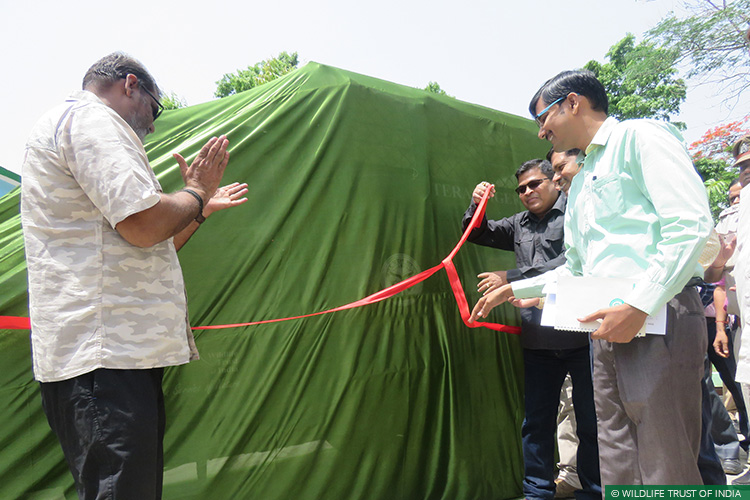 Pilibhit Forest Department officers and WTI’s Rapid Response Team members at the RRT launch in Pilibhit Tiger Reserve
Pilibhit Forest Department officers and WTI’s Rapid Response Team members at the RRT launch in Pilibhit Tiger Reserve
Pilibhit Tiger Reserve, Uttar Pradesh, 14th May 2018: To address and mitigate human wildlife conflict in the Dudhwa-Pilibhit Landscape, Wildlife Trust of India (WTI) launched its second Rapid Response Team (RRT) in Pilibhit Tiger Reserve. This RRT functions under WTIs Terai Tiger Project, with support from U.S. Fish and Wildlife Services and the Uttar Pradesh Forest Department. Launched in 2009, the project has been working with the Forest Department, concentrating its efforts towards mitigating conflict between humans and big-cat species (leopards and tigers) through the functioning of its RRT. A second fully equipped RRT will now be based out of the Pilibhit Tiger Reserve landscape, working on various aspects of human wildlife conflict (HWC) mitigation.
Dr P.P. Singh, Conservator of Forests, Bareilly, and, Field Director, Pilibhit Tiger Reserve, inaugurating this launch, mentioned that, “a well-equipped team with good expertise on the subject, and adequate preparedness, is the key to handling conflict situations in a timely, scientific manner. WTI has been working with the Uttar Pradesh Forest Department since 2009 – a RRT team based out of Pilibhit Tiger Reserve will now function in this landscape”. Divisional Forest Officers of Pilibhit Tiger Reserve and Pilibhit Social Forestry Division (respectively) – Mr Kailash Prakash and Mr Adarsh Kumar, were also present during the launch, along with concerned forest staff and media persons.
Informing about WTIs interdisciplinary and long-term approach towards mitigation of HWC, Prem Chand Pandey, Project Head, Terai Tiger Project said, “The RRT comprises of a trained wildlife biologist, a sociologist, a wildlife veterinarian and a field assistant, thus covering three key aspects – biological, social and veterinary – of HWC resolution”. During conflict situations, the wildlife biologist tracks, monitors and studies movement patterns as well as behaviours of animals involved in human-wildlife conflict – which helps guide mitigation strategies in a conflict situation in the right direction. Social interventions play a crucial role and are carried out by the RRT’s sociologist. These involve creating awareness and sensitising communities which experience conflict, mainly through community integration and enhancing the capacity of community members, as well as in conflict prone areas, integrating local communities into participatory mitigation measures. The wildlife veterinarian’s work includes strategizing and executing animal rescues and captures, treatment and release of animals involved in conflict situations, besides conducting disease investigations, livestock immunizations in Protected Areas and attending to other wildlife emergencies.
While the above-mentioned responsibilities of team members typically function during times of conflict, the project also works towards integrating local community youth and other members into voluntary Primary Response Teams (PRT). PRT members, constituted from villages experiencing a high frequency of conflict, not only work alongside the RRT and the Forest Department during ongoing conflict situations, but also aim at reducing and/or resolving a conflict situation at the village level itself. “There are currently 10 PRT’s spread across the Dudhwa-Pilibhit Landscape, members of which are trained in different aspects of conflict mitigation regularly”, mentioned Pandey.
Notified in June 2014 as a distinct Tiger Reserve, Pilibhit Tiger Reserve constitutes almost 23% of the area of Pilibhit District. Covering over 730 km2, this reserve is important not only for its flora, fauna and landscape but also its connectivity to forest tracts such as Kishanpur WLS in Uttar Pradesh and the Royal Shukla Phanta Wildlife Reserve in Nepal. In recent years Pilibhit Tiger Reserve has witnessed several cases of human-tiger and human-leopard conflicts, leading to the death of at least six humans, this year alone.
 Dr PP Singh, Field Director, Pilibhit Tiger Reserve unveils the new RRT vehicle
Dr PP Singh, Field Director, Pilibhit Tiger Reserve unveils the new RRT vehicle